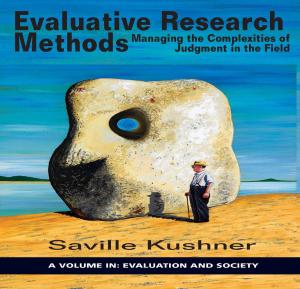Methodological Thinking in Psychology
60 Years Gone Astray?
Nonfiction, Reference & Language, Education & Teaching, Educational Theory, Educational Psychology, Health & Well Being, Psychology| Author: | ISBN: | 9781607524328 | |
| Publisher: | Information Age Publishing | Publication: | July 1, 2010 |
| Imprint: | Information Age Publishing | Language: | English |
| Author: | |
| ISBN: | 9781607524328 |
| Publisher: | Information Age Publishing |
| Publication: | July 1, 2010 |
| Imprint: | Information Age Publishing |
| Language: | English |
In recent years an increasing dissatisfaction with methods and thinking in psychology as a science can be observed. The discipline is operating under the tension between the traditional quantitative and the new qualitative methodologies. New approaches emerge in different fields of psychology and education—each of them trying to go beyond limitations of the mainstream. These new approaches, however, tend to be “historically blind” seemingly novel ideas have actually been common in some period in the history of psychology. Knowledge of historical trends in that context becomes crucial because analysis of historical changes in psychology is informative regarding the potential of “new/old and forgotten” approaches in the study of psyche. Some approaches in psychology disappeared due to inherent limitations of them; the others disappeared due to purely nonscientific reasons. And some new approaches were rejected long ago for welljustified scientific reasons. This book brings together contributions from leading scholars in different fields of psychology cognitive psychology, developmental psychology, cultural psychology, methodology of psychology. Each of the contributors discusses methodological issues that were more thoroughly understood more than half a century ago than they are now. Overall, the contributions support the idea that in important ways 60 years old psychology was far ahead of the most recent trends in mainstream psychology.
In recent years an increasing dissatisfaction with methods and thinking in psychology as a science can be observed. The discipline is operating under the tension between the traditional quantitative and the new qualitative methodologies. New approaches emerge in different fields of psychology and education—each of them trying to go beyond limitations of the mainstream. These new approaches, however, tend to be “historically blind” seemingly novel ideas have actually been common in some period in the history of psychology. Knowledge of historical trends in that context becomes crucial because analysis of historical changes in psychology is informative regarding the potential of “new/old and forgotten” approaches in the study of psyche. Some approaches in psychology disappeared due to inherent limitations of them; the others disappeared due to purely nonscientific reasons. And some new approaches were rejected long ago for welljustified scientific reasons. This book brings together contributions from leading scholars in different fields of psychology cognitive psychology, developmental psychology, cultural psychology, methodology of psychology. Each of the contributors discusses methodological issues that were more thoroughly understood more than half a century ago than they are now. Overall, the contributions support the idea that in important ways 60 years old psychology was far ahead of the most recent trends in mainstream psychology.















